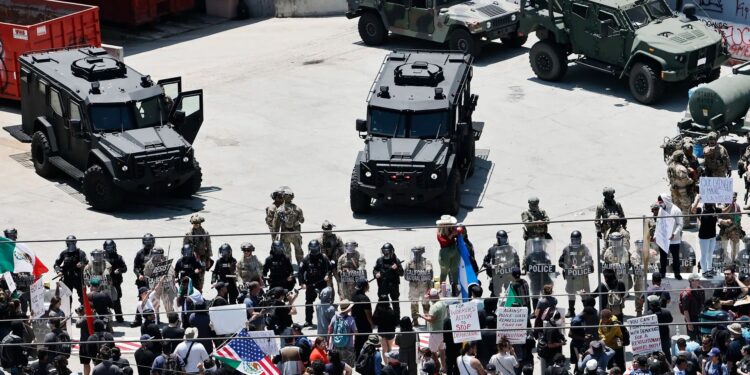Los Angeles remains under curfew following a series of mass protests and sporadic unrest, as tensions between local leaders and former president Donald Trump continue to shape the political tone around public safety and federal authority. With a divided response to rising civic pressure, the city finds itself at the heart of a broader national debate over leadership, policing, and protest rights.
The latest 9 p.m. to 5 a.m. curfew, announced late Monday, was implemented in anticipation of further demonstrations that have swept through downtown LA and West Hollywood since the weekend. The unrest stems from longstanding frustrations over police conduct and broader social inequalities, with protests triggered by the national climate of political polarisation.
Mayor Karen Bass, elected as LA’s first female mayor and a former Democratic congresswoman, has sought to balance law enforcement needs with the constitutional rights of protesters. She has consistently emphasised de-escalation, local control, and community dialogue. In public statements this week, Bass made clear her opposition to federal interference, directly criticising Trump’s calls for a more forceful response.
“We will not allow our city to be used for political theatre,” Bass stated in a press briefing, alluding to Trump’s recent Truth Social posts accusing her of “weak leadership” and threatening to send in federal forces. The mayor, who has dealt with a rise in both peaceful protests and criminal opportunism, has drawn a line between legitimate grievances and disorder, while rejecting what she calls the “militarisation” of civic spaces.
California Governor Gavin Newsom echoed her sentiments, saying the state “won’t be bullied by empty threats” from the former president. “Trump thrives on chaos,” Newsom told reporters in Sacramento. “But California believes in democratic order, not intimidation.”
The strained relationship between Trump and California’s leadership is long-standing, rooted in disputes over climate, immigration, policing, and pandemic policy. This week’s confrontation is just the latest flashpoint in a volatile political feud. Trump’s push for federal intervention — often via provocative online rhetoric — has been dismissed by both Newsom and Bass as political posturing designed to rally his base ahead of the 2026 midterm elections.
Meanwhile, law enforcement agencies in Los Angeles continue to monitor demonstrations closely. Police Chief Dominic Choi, acting after the retirement of Michel Moore, said that most protests have remained peaceful but acknowledged “isolated incidents” of vandalism and looting. He also noted that the curfew is a temporary measure aimed at restoring calm, not stifling protest.
Civil rights groups, however, have raised concerns about the curfew’s legality and its disproportionate impact on marginalised communities. Legal challenges are expected if enforcement becomes aggressive or arrests increase.
With the city on edge, Mayor Bass has called for a coalition of civic leaders, faith organisations, and youth activists to meet this week in a town hall format. The aim is to defuse tensions and rebuild trust. “The solution isn’t more force,” she said. “It’s more listening, more justice, and more accountability.”
As Los Angeles navigates these challenges, the contrast between local governance and Trump-era federal tactics remains stark, and symbolic of the wider battle over American urban policy and political identity.
newshub finance



Recent Comments